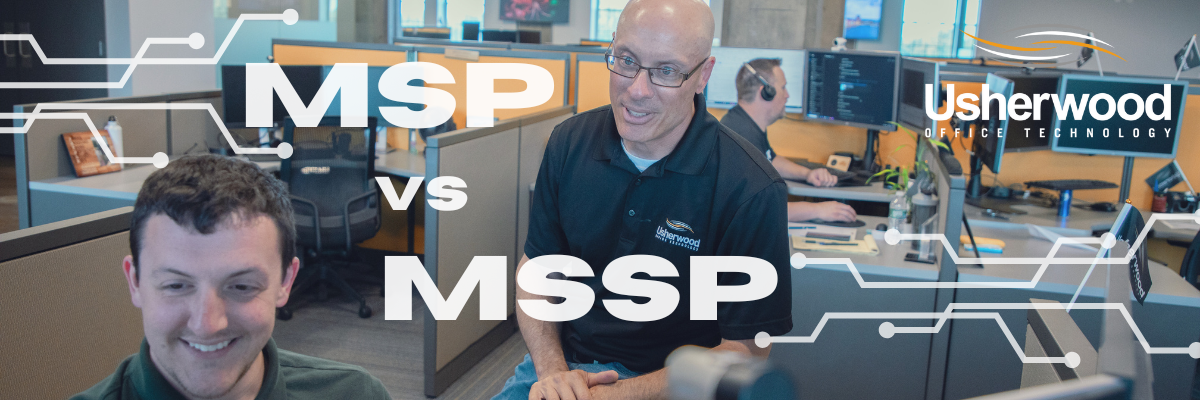By: Jada Sterling, Digital Content Manager on January 18th, 2024
MSP vs MSSP: What’s the Difference?
If you're looking for IT outsourcing, you might be confused by all the acronyms used by different service providers. You might see a service provider refer to themselves as an MSP, MSSP, or MDR. So, what’s the difference? Here’s a rundown of what they are, how they overlap, and what factors to consider when choosing one.
What is an MSP?
Managed Service Provider(MSP) offers general IT services to manage your overall network and technology needs. From day-to-day tech troubleshooting to cybersecurity, an MSP will allow you to fully outsource your IT to a team consisting of service technicians with a range of expertise.
If you work with an MSP, you’ll find they have a range of different competencies including a Technical Assistance Center, and Virtual Chief Information Officers (VCIOs). Services offered by MSPs include:
- Engineering projects
- Quarterly Technology Roadmap
- Vendor management
- Compliance management
- Advanced security
To read more about what you get when you partner with an MSP, read our article: What Ongoing Services Do You Receive From an MSP?
What is an MSSP?
An MSSP, or Managed Security Service Provider, will offer a more focused set of services in cybersecurity. An MSSP will provide 24/7 security monitoring for your network, preventative services such as security awareness training, and assistance with data security compliance. Within these organizations, you will likely have access to a Security Operations Center (SOC) to assist with security implementation and troubleshooting.
In addition, a typical MSSP will offer advanced cybersecurity services including:
- Threat monitoring and management
- Firewall management
- Patch management
- Endpoint security
- Penetration testing and vulnerability testing
There are many other ways MSSPs will assist you in protecting your business. For example, they may consult you on the best ways to go about applying for cyber insurance. As cybercriminals develop more complex hacking methods, it becomes harder to qualify for cyber insurance. This makes it essential to have a partner to advise you on how to apply.
To read more about how to qualify for cyber insurance, read our article: Is Cyber Insurance A Critical Part of Your Cyber Attack Survival Kit?
What Are the Key Differences Between MSP and MSSP?
The main difference between an MSP and MSSP is that an MSP will have more robust offerings for technology management and holistic service. An MSSP focuses on cybersecurity, while an MSP helps with cybersecurity and other aspects of information and technology management.
When you partner with an MSP, you will have experts in your corner to help you define the tools you want to use, your plan to refresh them after their natural lifecycle, and how you set them up to enhance productivity and security.
Can an MSP Be An MSSP?
You may wonder if an MSP could also be considered an MSSP. Since an MSP also offers cybersecurity services, it would fall under the category of MSSP. However, an MSSP provider cannot be an MSP if they only offer cybersecurity services.
Think of it like a car dealership vs an auto shop. A dealership will service vehicles as a part of their offerings, along with selling and leasing vehicles, so it’s considered an auto shop as well. On the other hand, an auto repair shop wouldn’t be considered a dealership as they only specialize in auto servicing.
Reasons to Partner with an MSP or MSSP
When you’re mapping out your IT budget, it can be tempting to simply bring on a full-time in-house IT specialist. However, a team of only one or a few IT professionals might come at a cost.
Having IT staff within the company is more expensive than outsourcing managed IT services. This is because it requires paying for a full-time employee's salary, benefits, PTO, and other related expenses.
You might also find that an individual will have much less knowledge and years of experience than a managed IT team. This is because MSPs and MSSPs will hand-pick teams of experts in the IT field to bring a wide scope of knowledge and skill.
Mitigation of Cyber Threats
You don’t want to wait until you’re a victim of a cyber attack to invest in an MSP. The average cost of a cyber attack is well over $900k, and that’s not including lost revenue from a tarnished reputation. Costs associated with data breaches include:
- Investigations from outside vendors
- Government fines
- Lawsuits from afflicted parties
- Ransomware payments
You can face big legal troubles if your business is a victim of cyber-attacks, which are an increasingly common threat as cybercriminals target businesses. The New York State Attorney General issued a large fine of over $300k to a home healthcare company. An investigation deemed the company negligent for foregoing basic cybersecurity protections, resulting in thousands of sensitive staff and client records being exposed to cybercriminals.
To learn more about the legal troubles that can follow a cyber breach, read our blog: Can My Business Get Sued for a Cybersecurity Breach?
Troubleshooting Your Network
Everyone knows the familiar headache of dealing with technical issues. When things go wrong with your network, productivity can grind to a halt. When something isn’t working, being able to call and get a real person on the phone to help you work through a solution can be a lifesaver.
A quality MSP will have experienced and friendly customer service technicians with the knowledge to help you solve any technical issue. Since even the most basic technology can be finnicky, problems are bound to arise at some point. Don’t gamble on essential tools that your customers and staff need to make your business run smoothly.
Finding Scalable Solutions
Partnering with an MSP will ensure you have enough buffer room, so you don’t find yourself in a tight spot with outdated devices. It also allows for predictability, which is your best friend in budgetary planning and decision-making.
Knowing exactly what you will spend month-to-month on IT will allow you to scale effectively as your business grows. With updated and functional technology, your employees are more likely to be productive and happy, which can boost your retention rate and foster growth as well.
To learn more about how technology planning is a springboard for growth, read our blog: Ask The Expert: How Technology Management Can Expedite Your Business Growth
Complying With Industry Regulations
If your business is within an industry with strict data compliance regulations, you’ll likely have a few hoops to jump through with cybersecurity. It’s wise to invest in an MSP with experience working with businesses within your industry, so they know what regulations you need to follow.
Businesses in healthcare, finance, and legal are among those with the most responsibility to protect sensitive data, due to HIPAA and other guidelines. Cybercriminals target businesses with valuable data, as leaking it can cause significant harm.
How To Choose an MSP
When you’re deciding on what MSP is right for you, take a look at their reviews and their different service offerings. They should have experts in a range of services such as cybersecurity, technology management, business communications, and security systems. This way, you’ll have a one-stop shop for your needs.
If you’re ready to upgrade your technology with a dynamic MSP, click the button below to speak with a managed IT expert.
Read On

Incident Response vs Disaster Recovery: What's the Difference?
When you're researching different strategies to protect and prepare your business for cyber...

EDR vs Enterprise Antivirus: What’s the Difference?
Every year, cybercriminals invent new ways to attack business servers. Most businesses focus...

The Difference Between Antivirus and Firewall Security
There are so many tools on the market that claim to protect your network from cyberattacks. In the...



